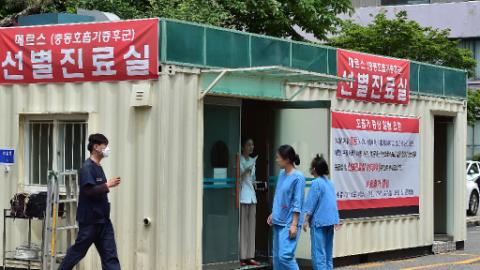[tweet][digg][Google][pinterest][follow id=”TheEconomy9ja” size=”large” count=”true” ]
South Korean authorities have announced the confirmation of the country’s first deaths from the deadly Middle East Respiratory Syndrome (MERS), in the wake of the largest outbreak of the viral disease outside the Middle East.
A 58-year-old woman reportedly died of acute respiratory failure on Monday and tests later came back positive for MERS with about 25 people also infected, South Korea health ministry disclosed on Tuesday. Another victim, a 71-year-old man who also tested positive of the deadly MERS virus died on Tuesday triggering public alarm over the epidemic across the country.
Previously, the only other fatal MERS case in Asia was a man who died in Malaysia in April 2014. The first case — a 68-year-old man diagnosed after returning from a trip to Saudi Arabia — was reported on May 20.
Isolation for Prevention
With no known curative or preventive drugs yet available, the South Korean authorities have focused their efforts on isolation of suspected patients to avoid further spread of the deadly virus across the country. Around 750 people who were exposed directly or indirectly to the virus have now been placed under mandatory or voluntary quarantine.
Health Minister Moon Hyung-Pyo has appealed to people placed under voluntary quarantine for the two-week incubation period to observe isolation guidelines to avoid exacerbating the epidemic. “Those who are quarantined must be experiencing a lot of inconveniences in their daily lives, but please closely cooperate for the safety of yourself, your families and your neighbours,” Moon said.
He also urged citizens to wear surgical face masks in public places and to wash their hands frequently in order to ward off infection.
Critical concerns
There are growing fears that the MERS epidemic might be a tough nut to be crack for the Koreans. Concerns were further fuelled by the health ministry’s announcement of the two new cases involved tertiary infections.
Previously, all the infections had involved patients in the same hospital as the initial carrier, their relatives or hospital staff with whom they came into contact. “We are tracking down additional cases (of tertiary infection)…with the possibility of more new infections in mind,” said Kwon Jun-Wook, a senior health ministry official leading an emergency task force team.
More are expected to be quarantined or put under observation, Jun-Wook said, adding that some 240 people have been banned from travelling overseas. According to him, three patients are currently in critical condition.
As part of growing public hysteria over the MERS epidemic, an unnamed primary school in Gyeonggi province, located near the hospital where the female victim died, has been shut down temporarily as parents withdrew their children with dozens more schools in the area also considering temporary shutdowns.
Government talks tough
South Korean government has declared itself ready to do anything necessary to curb the spread of the rampaging viral disease in a record time. Acting prime minister, Choi Kyung-Hwan vowed that “all-out efforts” to curb the spread of the virus has kick-started amidst growing public concern that government’s initial response was ‘poor’. “We should use all our national resources to alleviate public concerns,” he said.
The government came under public barracking for its initial tepid response to the outbreak, especially for allowing an infected man to travel to China last week despite warnings from doctors.
The 44-year-old left on a business trip on Tuesday, a day after his father was diagnosed with the virus, and was confirmed Friday to have been infected himself. The unidentified man flew to Hong Kong before travelling on to the Chinese city of Huizhou, where he is being treated under quarantine.
What is MERS?!
Middle East Respiratory Syndrome is considered a deadlier but less infectious cousin of Severe Acute Respiratory Syndrome (SARS), which killed hundreds of people when it appeared in Asia in 2003.
More than 20 countries have been affected by the MERS virus, which has no known cure or vaccine, with most cases in Saudi Arabia where it has claimed more than 400 lives since 2012.
By Olisemeka Obeche (with AFP reports)
[divider]



